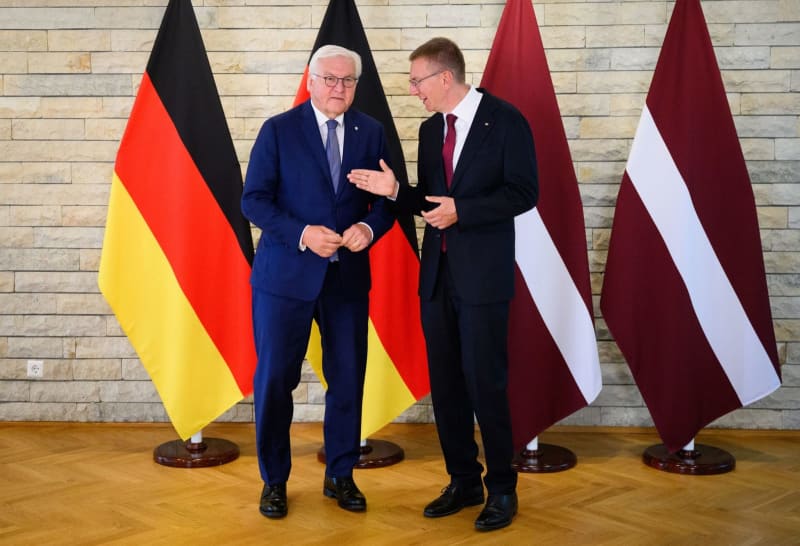German President Frank-Walter Steinmeier on Tuesday concluded his three-day trip to the Baltics with a visit to Riga, where Latvian President Edgars Rinkēvičs praised Germany’s increased role in European security.
“Germany is a European great power and an economic centre,” Rinkēvičs told dpa. “Therefore, it is logical that Germany assumes a greater role in European security and defence policy. This is to be welcomed.”
The new German government’s plans to make its armed forces – or Bundeswehr – the strongest conventional army in Europe have not raised any concerns in Latvia, Rinkēvičs said.
“Germany has convincingly proven over decades that it is a democratic, constitutional state based on Western values. Therefore, I have no concern,” the Latvian leader said.
“I fully support the development of the German armed forces. This is in the interest of the security of all of Europe,” he added.
He called relations between Berlin and Riga “really excellent.”
“Latvia sees Germany as an important NATO ally for ensuring the security of the Baltic Sea and as a partner in the EU,” said Rinkēvičs, highlighting the stationing of a German armoured brigade in neighbouring Lithuania as a boost to regional security.
Steinmeier calls for European cooperation on defence
At a press conference, Steinmeier called on European partners to engage in closer cooperation on defence production and procurement in response to the threat from Russia.
“We must invest more in the defence industry,” Steinmeier said. “We need much closer, much better cooperation in Europe on production and also on procurement, in order to close gaps in military capabilities.”
The Russian invasion of Ukraine has shown that more capabilities are needed, including “here in the Baltic,” the German president argued.
In response, Rinkēvičs said Latvia is seeking ways to build up production facilities for defence equipment and ammunition.
Latvia, a Baltic state on NATO’s eastern flank that borders Russia and Belarus, views Moscow’s full-scale war against Ukraine as a direct threat to its national security.
The government in Riga has therefore increased military spending, undertaken significant rearmament, gradually reintroduced conscription and fortified its eastern border against potential attacks.
“The greatest shared challenges are, of course, Russian aggression against Ukraine and the threat to peace and security in Europe posed by Russia,” Rinkēvičs told dpa. He added that the EU’s security, defence capabilities and competitiveness must be “significantly” strengthened.
Steinmeier’s12th visit
The visit marked Steinmeier’s 12th official trip to Latvia in his long political career.
“I have known Frank-Walter for a long time and greatly value the opportunity to discuss any topic with him openly and honestly,” said Rinkēvičs, who described his relationship with his German counterpart as “excellent.”
Both politicians were once foreign ministers and are now heads of state in their respective countries. “This visit continues our regular dialogue – we meet practically every year,” Rinkēvičs said.
The two presidents held a working lunch with representatives of German defence companies.
They also visited the Braunschweig, a German Navy corvette moored in the immediate vicinity of the presidential palace in Riga.
The warship is taking part in a NATO mission termed “Baltic Sentry,” which aims to improve security in the Baltic Sea region.
One of its tasks is to monitor shipping traffic and potential threats to critical infrastructure such as data cables, pipelines and wind farms at sea.
This was triggered by recent damage to several submarine cables in incidents attributed to ships linked to Russia.
The NATO ships, including the German corvette, are to show an increased presence in the Baltic.
Steinmeier emphasized that the deployment was far more than just symbolism, saying that Latvia has reported fewer incidents since the NATO ships began monitoring underwater infrastructure.
“That’s exactly what we wanted, and it’s not just symbolic politics,” the German leader said.
Steinmeier was due to return to Berlin on Tuesday after a three-day visit to the Baltic region.
He attended national day celebrations in Lithuania on Sunday before a visit to a Holocaust memorial near Vilnius on Monday.
